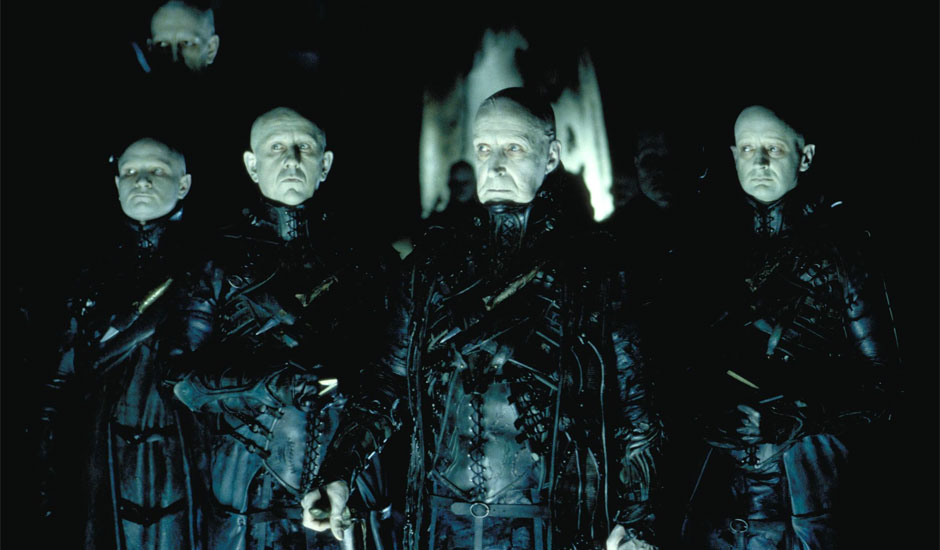5. Still Alice

Memory’s archenemy is Alzheimer’s. Its black eraser has snuffed out far too many minds of unsuspecting loved ones, and the symptoms are hard to witness, but incomparably harder to experience. Still Alice focuses on Alzheimer’s and is arguably its best cinematic portrayal.
Julianne Moore plays Alice Howland, a 50-year-old mother and linguistics professor at Colombia University. Incredibly successful with a loving family, her life changes when she is diagnosed with early-onset Alzheimer’s. The film follows her and her family struggling through this tragedy.
First, she cannot remember simple words. Then she starts forgetting faces. Soon she is unfocused, disoriented, and her work suffers. She is let go as a result. Eventually, her mind deteriorates to such a degree that she cannot recognize her own house, or her own daughter. The final regression is similar to locked-in syndrome: alive and conscious but without memory. There’s still a spark, however, and it’s ignited by love.
Moore’s performance was universally praised and won her an Oscar for best actress in 2015. This was all that was needed for Still Alice’s placement as Alzheimer’s top cinematic representative.
4. Dark City

Dark City has quietly influenced a whole message board of sci-fi content in the 21st century. It has a gripping story, stunning visuals, and is set in such a darkly seductive world that The Matrix has been accused of ripping it off. Though these qualities are mentioned ad nauseam in relation to Dark City, the theme of memory is an equally-important feature of this dystopian masterpiece.
John Murdoch awakes without memory in a hotel bathtub, knowing only that people want to kill him. This is because he averted the process of memory tampering by a terrorist group known as The Strangers, and is wanted for murders he can’t remember nor did he commit. He is the only person to escape this procedure—which is more widespread than originally thought—and seems to be the only person to realize that it is always night in Dark City.
With the help of his forgotten wife and a former perpetrator of memory imprinting, Murdoch falls deeper into the knowledge of an elaborate conspiracy which will reveal his identity, The Strangers’ purpose, and the nature of the city. The reveal is something we don’t want to spoil.
Memory, identity, and humanity coalesce in Dark City, a poignant study on what it means to be.
3. Mulholland Drive

Fear is an important facet of memory loss. The confused state of those whose lives have escaped them is one that is soaked in fear. Think of it as a mental purgatory; a place between higher consciousness and no consciousness. The full awareness of the loss of awareness.
This is where Rita is living in David Lynch’s Mullholland Drive. Rita survives a car crash on Mulholland Drive in Los Angeles and wanders, brain damaged, into a vacant apartment. “Rita” is the name she adopts after viewing in the apartment a poster of the film Gilda, which stars Rita Hayworth. She is then found by Naomi Watts’s character, Betty, when she visits her aunt’s apartment which Rita is instead occupying. Betty, an aspiring actress, is keen on helping Rita recall her memories, so she searches for clues. She finds a blue key in Rita’s purse, so the two women go in hunt for the door to Rita’s identity.
Identity is the most coveted thing in Hollywood, but also the most evasive. Instead of finding answers, Betty and Rita find themselves in a frightening, surrealist adventure that only David Lynch could orchestrate. The audience is no easier in understanding a film that used memory as a weapon. Rita’s uncertainty becomes the viewer’s as she and Betty descend into the fear and paranoia of not understanding one’s self or one’s reality. Memories without context are no help at all, just memes without Facebook.
2. Eternal Sunshine of the Spotless Mind

For those who have suffered such a traumatic breakup that you wish the whole relationship could be erased from your mind, Eternal Sunshine is the film for you.
Joel and Clementine, played by Jim Carrey and Kate Winslet, respectively, live in a world where this option exists. After a long and complicated relationship, Clementine and Joel elect to have the memories of one another removed from their minds.
The film then takes us backwards through the process. We see the relationship through the memories in Joel’s brain as the company works to get them purged. A profound sadness hovers over the film, as the audience is aware that what they’re seeing has been erased. What were separated as good and bad memories are really just an irreplaceable portion of Joel’s self that is lost forever. Resentment is selective, but regret is indiscriminate.
But the film does not end there. Exploring the complexities of memory, personality, and causality, Eternal Sunshine shows that what happened was going to happen anyway so there was no use in trying to thwart predestination. Joel and Clementine, newly erased, take the same impromptu trip to an obscure beach and meet for the first time, again. They fall in love all over again, but soon find the evidence of the erasure, and the files detailing their hectic relationship. Despite the re-discovered memories and the fear of reliving the same hardships as before, they decide that it’s worth it.
1. Memento

What could be a better film on memory than one that memory defies to make sense of?
Memento follows a man with anterograde amnesia, a condition which causes persistent short term memory loss and the inability to form new memories. This is a supreme annoyance since the man is determined to discover the source of the trauma which caused this mind-wipe: the man who attacked him and killed his wife.
Every five minutes his mind is erased and he has to start the investigation over again, so he constantly takes Polaroid photos and tattoos his body with important information to refresh his memory and jumpstart the hunt.
Using a fragmented, nonlinear narrative to connect us directly to the man’s brain, Memento gives the audience the illusion of anterograde amnesia to better understand the condition and the inability to remember the horrifying reason for this suffering.
At film’s end, the disparate strings of meaning attach and reveal one of the most simultaneously cerebral and thrilling—and still confusing—movies in mainstream cinema.